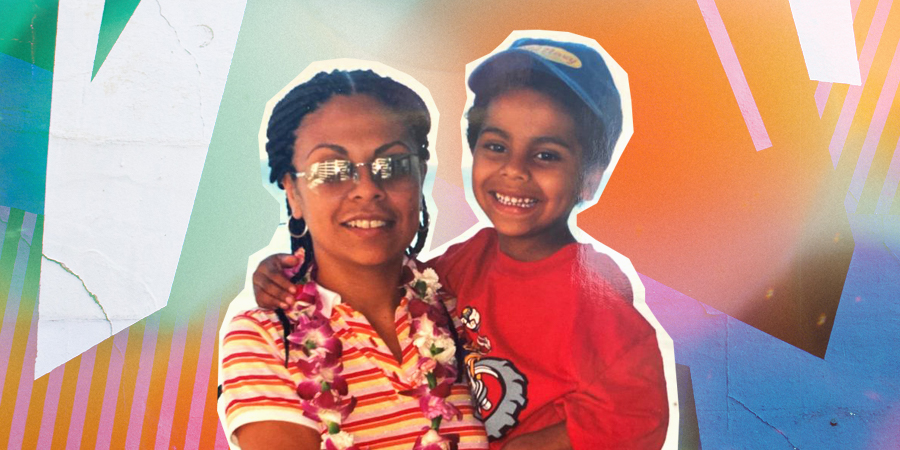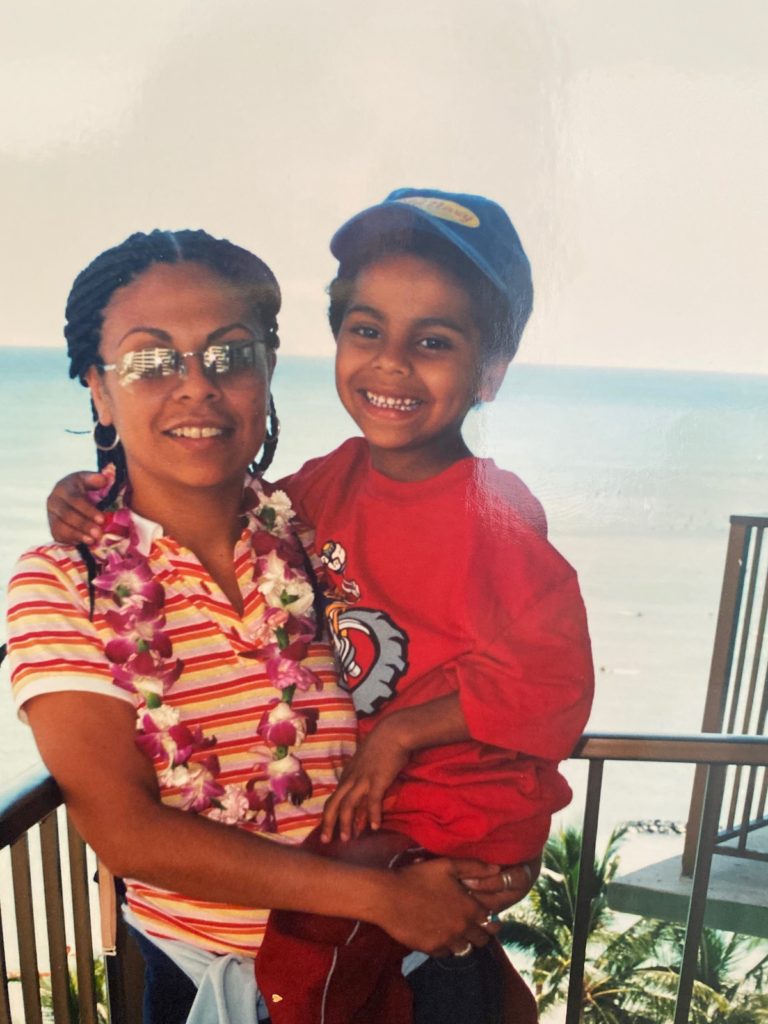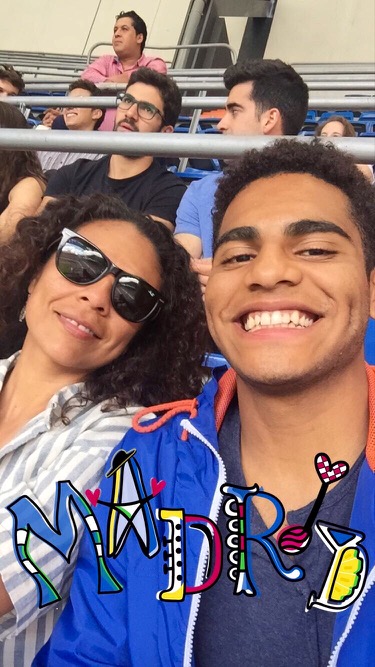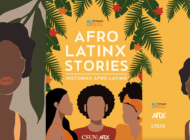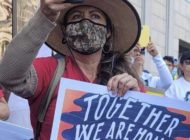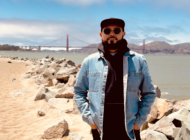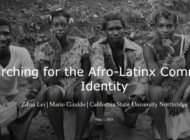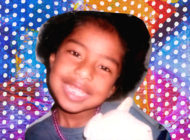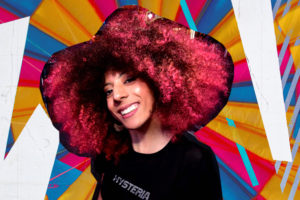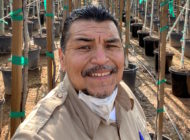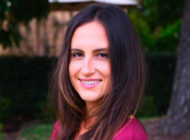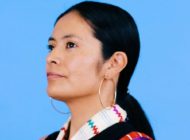In this episode, Camille Lehmann interviews Devin Nazar Cager about growing up with a Salvadoran mother and not having his father or his father’s African-American culture present.
Por CAMILLE LEHMANN
EL NUEVO SOL
Camille Lehmann: Welcome to Radio Nepantla, a podcast from El Nuevo Sol, the multimedia site for the Spanish-language journalism program at California State University at Northridge. My name is Camille Lehmann. The title of this series is Afro-Latinx. We want to tell here diverse stories of Afro-Latinx, Black-Latinx, and Afro-Latin American identity. According to the Pew Hispanic Center, one out of every four Latinos in the nation identify as Afro-Latinx. This is the same proportion of Afro-Latin Americans in that region. We decided to use the term Afro-Latinx—with X—to be inclusive of non-binary people. The umbrella term “Black-Latinx” refers to biracial people with one African-American and one Latinx parent. The umbrella term “Afro-Latin American” refers to people of African ancestry in Latin America.
Camille Lehmann: In this episode, I interviewed Devin Nazar Cager, a student from the University of California, Santa Barbara.
Devin Nazar Cager: My full name is Devin Nazar Cager. Nazar is from my mom’s side and Cager is from my dad’s side. I’m half Black, half Salvadoran. I’m 23.
Camille Lehmann: During our talk, Devin gave us some insight on his life and how he grew up. We went into detail of what it was like growing up with a Salvadoran mother and not having his father or his father’s African-American culture present.
Devin Nazar Cager: Okay, so I grew up in L.A.—San Fernando Valley. Um, I went to private school for most of my young life, you know, from kindergarten all the way through high school. It was Catholic school, so I guess I was kind of religious at first. And yeah, I grew up with my mom and my grandparents—in our grandpa and my grandma’s house. And she had a daycare there. Yeah, we all live there.
I grew up eating Salvadoran food, for sure. And my grandma always cooked that stuff, you know, pupusas—all kinds of stuff, breakfast, like tomatoes and onions and stuff. But I also had like burgers… All kinds of food honestly.
Camille Lehmann: At home, Devin never felt different, his grandparents always made him feel welcomed. He grew up listening to a wide variety of music—in Spanish and English. He says that at family parties he would always hear Spanish songs and never really liked them until now. Since he’s gotten older, he’s become more appreciative of Spanish music because it reminds him of his culture.
He also picked up his mothers choice of music and grew up listening to a lot of hip-hop music as well. He mentioned that he felt like his mom was trying to teach him a little about his African-American culture but that she also just liked hip-hop in general.
Devin Nazar Cager: I grew up listening to a lot of hip-hop, like Kanye West and stuff. My mom played that a lot in the car—when we would drive around and that’s the kind of music that she liked. And she was the one that I really kind of got my music taste from, I guess.
Camille Lehmann: Growing up in San Fernando Valley in Los Angeles, California was a good thing for Devin because he never felt out of place. The San Fernando Valley is very diverse so growing up, he never really felt excluded because of his skin color or hair.
Devin Nazar Cager: Um, I never felt like I was different from everyone else. I feel like I was included, I don’t know. I think, because of where we live like in L.A. I think it’s such a mixture of cultures, but no one really has been kind of excluding me unless it was middle school. But in middle school, I think it was just like kid stuff. It wasn’t because they were actually racist. You know?
Camille Lehmann: While growing up living with his Salvadoran grandparents, Devin learned how to speak Spanish and spoke to his mother in English. He mentioned that he only grew up with his mother’s side of the family and that his father’s side was never present in his life.
Devin shared with me that he had only met his father once in his life and that it wasn’t the best experience for him. Since he never knew much from him and his grandparents and mother were not too fond of his father, he never had the desire to meet him. He went into detail about the day he met his father for the first time when he was about 7 or 8 years old.
Devin Nazar Cager: I think he was living in Sacramento and he wanted to come and meet me. I think it was like, I don’t know how old I was—I think it was like, seven or eight, somewhere around there. And it was the first time I met him. Me and my mom pulled up at some hotel where he was staying. And yeah… from my perspective, I think my mom too, he was just being a little weird. He wanted to take pictures of us and he said, “oh, I have these presidents for you.” And I just felt like (he was) kind of hyperactive. And just I guess maybe he was just excited. But I didn’t like it. And I just wanted my mom. I kept telling my mom, “let’s go, let’s go.” And she’s like, “wait just, try and talk to him—try and see how he is”… And I really didn’t like him that much. And I got into the car and I kept telling my mom, “let’s go.” And then he got into the car and he was like, “no you guys don’t leave, don’t leave.” But I was like—I didn’t want to talk to him, really. Yeah, we ended up convincing him to go, and then we just left. We stayed for, like ten minutes—not even that long,
Camille Lehmann: After about ten minutes of seeing his father for the first time, Devin and his mother left because he was uncomfortable.
Devin Nazar Cager: I just wasn’t comfortable. I was kind of freaked out by the whole thing. It was just weird to me. And that was like, the one and only time I met him in person.
Camille Lehmann: After years of not speaking to his father, Devin mentioned that they later rekindled when he was in high school. He mentioned they chatted about basketball since his father was a player.
Devin Nazar Cager: In high school, he wanted to—he kind of tried to get in touch with me through Facebook. And I did talk to him for a little bit over Facebook messages just about life and basketball. He played basketball, too. So that was when I was like a freshman. And I was playing, I was on the team. And I just wanted to ask him how I could like get better because I wanted to play more on the team and stuff. And he kind of helped me. He said I should workout a lot more and I’m like a freshman—so I didn’t really work out or like to work out that much.
Camille Lehmann: Even though Devin didn’t feel comfortable when he encountered his father for the first time, he still feels that he missed out on a part of his culture. When he was younger it was harder for him to be fully aware about both cultures because he was missing the other half. He explained to me that it was a bit difficult for him growing up with his father not present in his life. Till this day Devin sometimes feels like he’s missing a piece of himself or his identity.
Devin Nazar Cager: You know, it’s always weird, especially with your friends and like people in your class know about that kind of stuff. And they kind of make fun of you for that. And you just know, like, you see other kids with their dads—with their both parents, and like, damn, like, I wish I had my dad around or something like that. You know? Yeah, I always felt like that. I still feel like you know, I wish I had kind of that Black culture more around. You know, when I was growing up even now, yeah. Or… a father figure—I mean, I had my grandpa, I still have my grandpa and I kind of consider him that, male figure to look up to. And he was—I feel like he was a good grandpa and like a good guy for me. But yeah, I did.
I mean, now I accept it, you know? And it doesn’t bother me like that—like how you see—but as a kid, for sure. You know, you want your dad especially as a like a boy, you know? You want your dad around, like—toss the ball. At this point, I’ve accepted who I am—and I like where I am.
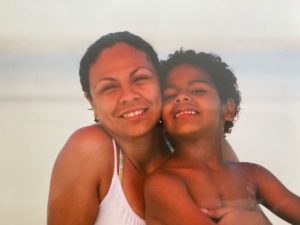 Camille Lehmann: Growing up with one parent must be difficult for the child but also for the single parent. Devin’s mother had to go through this experience alone and also had to explain to Devin about his other half.
Camille Lehmann: Growing up with one parent must be difficult for the child but also for the single parent. Devin’s mother had to go through this experience alone and also had to explain to Devin about his other half.
When did you even find out that your father was Black? How did that even happen?
Devin Nazar Cager: I think from an early age, she always told me. Or, I would ask her, you know. I felt like I could ask her and she would bring out—she had like this folder. I think she saved for me—when I was born like, my dad in the newspaper. Because for his high school, he was like a really good basketball player. So she would show me those and she would show me about him. And I think that’s how I knew, through my mom telling me about him…
Camille Lehmann: Since Devin’s father left his mother when she got pregnant, his Salvadoran side wasn’t a big fan of him. Devin mentioned that he grew up not hearing great things about his father due to the fact that he just walked away.
Devin Nazar Cager: My grandparents would talk bad about him, and my mom, I guess my mom, too. And my grandpa would be like, “oh, you don’t need him around.” You know, “you don’t need him, he left you—he left all of us.” So, “he’s not good enough. He’s just like dirt.” You know? Yeah, I don’t—I don’t know. I think he just didn’t want to, you know, be in charge of a kid. I don’t think he was ready. Or, he just didn’t want to. So my mom moved to L.A. from Modesto. And he stayed there. My mom was 22. So I think you have to be around that age.
Camille Lehmann: After Devin opened up about the things he heard as a young child, I asked him if his grandparents’ or mothers’ perspective triggered him into getting the mindset of not wanting him around, or simply not wanting to meet him.
Devin Nazar Cager: I think there’s a part of me that, you know, doesn’t really, because I feel like I don’t need him anymore. And that at this point—so, why would I really talk to him? But I don’t know. Maybe it would help me grow just knowing what his point of view was because maybe there was some other stuff that was going on—and I’m just seeing one side of the story.
Camille Lehmann: Overall, Devin mentioned that he believes his dad was simply not ready to be a father and that he understands him, because he’s 23 now. But because he didn’t have a dad growing up, he said that at this point he would want to stay there for his (own) kids. As Devin matured, he was able to put himself in his father’s shoes a little bit. He thinks that since he’s grown he might want to meet his father again in the future.
Devin Nazar Cager: I think I will give him a chance. But I just don’t know how he’s going to act, or how he’s going to be and it’s going to suck for me not to like him. And from what I remember, which was so long ago, it’s kind of unfair to keep the same mindset, I guess, but I don’t know. He was kind of weird back then. So I don’t know probably gonna be weird again. Or maybe he’s gonna be cool. But I guess, I guess I am curious to see… so maybe.
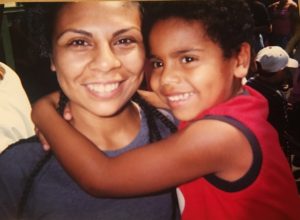 Camille Lehmann: We then continued to talk about his childhood and his environment throughout school. When Devin explained his life in school, he mentioned that he never cared about race and hung out with kids from many different races.
Camille Lehmann: We then continued to talk about his childhood and his environment throughout school. When Devin explained his life in school, he mentioned that he never cared about race and hung out with kids from many different races.
Devin Nazar Cager: In middle school, kindergarten through middle school, I was like the only Black kid there. So I mostly hung out with Honestly, I feel like everyone, well, not everybody, but like, I didn’t really care about race. You know, I just think I was who I thought was cool. And it was mostly Filipino kids at my school and middle school. So that’s who I really hung out with.
Yeah, I feel like it was. I think it’s just like, especially because I was the only Black kid there. I think it was kind of weird to kind of let something easy to make fun of and kind of feel left out for.
Camille Lehmann: He mentioned that since he was the only Black kid in middle school, sometimes he would get picked on or made fun of but he always believed that it was little kid things and never felt like they were being racist towards him. In highschool, there were more races and Devin hung out with the Black kids on sports teams and then the Latinos when he got off sports.
Devin Nazar Cager: So and at first I hung out with, like, the sports teams, like a lot, a lot of Black kids on the football team and stuff like that. And some of the Latinos, too. But um like, as I grew older, I kind of stopped playing sports, and I kind of gravitated more towards some Latinos. But again, there were other people in our group that were of different races. And I just and I wasn’t like purposely gravitating towards more Latinos. I think there was a good amount of Latinos at my high school. So yeah, just fell into a certain group. And they happen to be majority Latino.
Camille Lehmann: Growing up Devin mentioned that he would get statements like you’re not Black enough? Or you’re not Latino enough?
Devin Nazar Cager: It was never Latino. It was always like, you’re not Black. You know, like, you’re not actually Black. I guess because they were just like, they would be around my family and like who I am. And I guess I’m not stereotypically Black, I guess, you know. and I speak Spanish too. So they tried to like, I would hate when people tell me that too. Because it’s like, You’re so dumb. That’s how I would like feel about them. But yeah, people would always say that to me.
Camille Lehmann: Although he speaks Spanish and feels more connected to his Salvadoran roots, he mentioned that people usually classify him as Black because of his skin color and hair. He never felt ashamed of being black and always accepted who he was, even though sometimes he would get made fun of because of his hair.
Devin Nazar Cager: I’m pretty sure like that everyone saw me or still sees me as Black majority Black, so they get to know me and then you know, they realize that I can speak Spanish and then I’m half Latino. But I think when people first see me, they see me as Black. I think people I think just in general, a stranger, probably think I’m Black. Yeah. I mean, if they’ve heard me, maybe they would have known that I’m mixed.
Camille Lehmann: For people that are mixed it becomes a bit challenging when filling out papers and figuring out what to identify as. I asked him what he identified as on paper for college applications and important paperwork.
Devin Nazar Cager: Um, well usually on that kind of stuff there’s no mix. So I always kind of put like other race. And then there’s another one that asked like, ethnicity, Hispanic or Latino. So I put that, so I put other race and Hispanic or Latino.
Camille Lehmann: Devin was always in a bubble in the San Fernando Valley and didn’t know what it was like to be living in areas that aren’t as diverse. After graduating high school he moved to Santa Barbara to attend university at UCSB. His experience there was much different than living in the SFV.
Devin Nazar Cager: I feel like Santa Barbara, especially like universities, where the majority of white people. And I think that was a shock to me because from where I’m from, I really didn’t have that many white friends. And I mean, there was white people at my high school, but I really didn’t hang out with them as much. So coming here, was kind of weird, because everyone’s white and I felt kind of, I just felt like a minority. I didn’t even it wasn’t even because I was Black or mixed or whatever. It was just because I was different than everyone else. But in my house, there’s some people that it’s like half and half. It’s kind of nice. So I kind of felt kind of included, because it was kind of mixed in my house.
Camille Lehmann: This new environment in college and in Santa Barbara in general, changed the way Devin views himself. Attending the University of Santa Barbara opened Devin to new experiences and realizations which helped him discover himself a bit more.
Devin Nazar Cager: Um honestly, I feel like it kind of made me prouder of who I am. Because I feel like I’m different. And in a good way, you know? Yeah. Kind of stands out a little bit.
Like I said, you know, there was times when I was made fun of when I was younger, but I feel like I’ve grown a lot and more mature now. I’m kind of an adult now. So I understand who I am. And I know that I can change myself and I don’t really want to change myself, you know?
Camille Lehmann: Devin then shared some advice for people struggling with their Afro-Latinx identity or that are growing up mixed with split parents who only know one culture. Something very important to Devin is that time heals and the more you learn to accept who you are the happier you will be.
Devin Nazar Cager: Yeah, I think that they should just accept who they are and be proud of who they are. Um and that it’s always going to get better. Because as you get older, you accept yourself and you learn to accept yourself and you just try to understand people better than like, the people that you grew up with and stuff like that. And, you know, not having a dad was I feel like for a bit a big part of my life and like it brought sadness to me, but in that, like as I got older, you know, it didn’t. It doesn’t bother me as much anymore. We kind of get over it and kind of move on, you know?
Camille Lehmann: Thanks for listening to Radio Nepantla—La Voz que Traspasa Fronteras. We invite you to listen to the rest of the series Afrolatinx… We will tell you stories of Afro-Latinx identity. Listen to our podcast on your favorite platform. You can also check out our SoundCloud channel—ElNuevoSol—or our website: ElNuevoSol dot net. This was a production of El Nuevo Sol—the multimedia project of the Spanish-Language Journalism program at Cal State University, Northridge. This episode was produced and edited by Camille Lehmann Voices: Camille Lehmann and Devin Nazar Cager. Music by the Afro-Colombian group Kombilesa Mi. See you next time.
Tags: #AFLX Afro-Latinx Black-Latinx Camille Lehmann David Nazar Cager mixed race podcast Radio Nepntla Salvadoran







